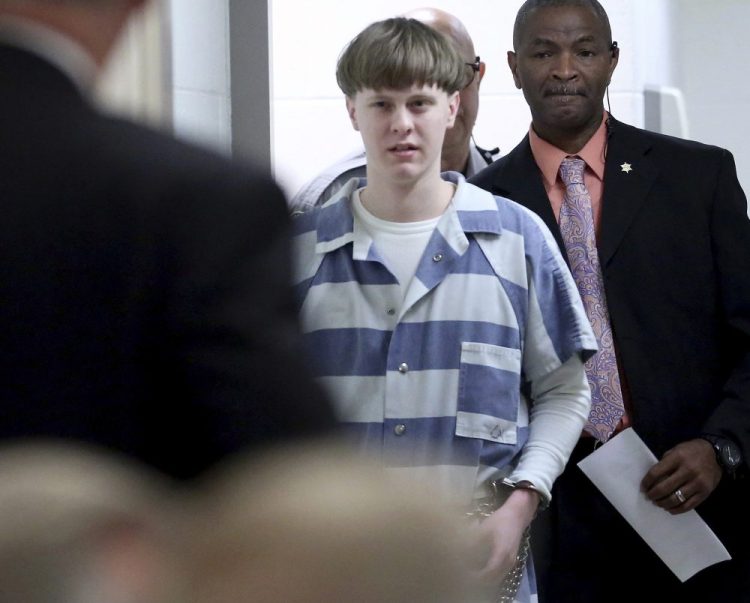Lawyers for Dylann Storm Roof, who was sentenced to death for killing nine black parishioners in a 2015 mass shooting at a historic Charleston church, appealed the capital penalty and his convictions on Tuesday.
The appellant’s opening brief claims the U.S. District Court for the District of South Carolina erred when it deemed the self-described white supremacist competent to represent himself. Roof, now 25, refused to allow his trial defense team to argue he suffered from mental illness. But his appellate lawyers now argue that the court ignored strong evidence that Roof showed signs of psychosis, schizophrenia spectrum disorder and autism spectrum disorder.
The gunman, who fired 77 rounds during an evening Bible study at Emanuel African Methodist Episcopal Church on June 17, 2015, was convicted on 33 counts and was the first person sentenced to be executed for a federal hate crime.
The 321-page brief, filed Tuesday in the U.S. Court of Appeals for the 4th Circuit in Richmond by his appellate attorneys, asks the court to evaluate more than a dozen alleged missteps that may have “tainted the trial.” Roof’s lawyers argue that the trial violated his constitutional rights by failing to declare the defendant incompetent, misapplying federal statutes and allowing emotional victim testimony.
“The prosecution’s first witness repeatedly called Roof ‘evil,’ and told jurors to send him to ‘the pit of hell,'” his attorneys said in the brief. Roof’s lawyers argue that the “inflammatory” and “dehumanizing” testimony incurably prejudiced the jury.
“Roof’s crime was tragic, but this Court can have no confidence in the jury’s verdict,” his lawyers argue.
Many of the claims in the appeal contradict Roof’s previous rejection of mental health issues. During the sentencing phase of the 2017 trial, Roof told the jury to ignore any claims his lawyers had made about his mental state.
“There is nothing wrong with me, except logic,” Roof told the jurors, according to the brief.
The Justice Department did not immediately reply to a request for comment late Tuesday, but prosecutors must file a response to the brief by Feb. 18. Roof’s lawyers declined to comment on the appeal.
The defendant resisted the diagnoses that psychologists offered the court throughout the trial. He said autism was for “nerds” and “losers,” according to court documents reported on by The Washington Post in 2017.
“I don’t have autism,” Roof said, according to the records. “I’m just a sociopath.”
But the appeal disputes Roof’s statements during his federal hate-crimes trial and claims he began to mask the depth of his delusions after his attorneys tried to have him ruled incompetent.
“The court clearly erred in finding Roof competent to stand trial and sentencing, and it violated his due process rights by holding inadequate competency hearings,” his appellate lawyers argued in the filing.
The brief claims that U.S. District Judge Richard Gergel from the District of South Carolina ignored testimony from experts who said Roof showed signs of serious mental health conditions. The lawyers argue Gergel should not have allowed Roof to represent himself at various stages of the trial because he suffered from a delusion that “his sentence didn’t matter because white nationalists would free him from prison after an impending race war.”
A court-appointed psychologist interpreted Roof’s indifference to his possible sentence as an extension of his “over-valued racist views,” rather than a delusion.
Roof repeatedly told the court he did not want to employ a defense built on the contention that he suffered from mental illness or cognitive disorders. His lawyers argue in the brief that he did so to protect his reputation in the eyes of a white supremacist rebellion he imagined would bust him out of federal prison.
“Roof believed white nationalists would stage a revolution, establish a new government, and set him free,” according to the brief. “Roof’s goal was not to secure a life sentence, but to avoid being labeled mentally ill because it would diminish his chance of rescue.”
When Gergel pressed Roof about his theory that the racist leaders of a coup d’etat would stage a prison break, the defendant demurred.
“Anything is possible,” Roof told the court, according to the brief. When Gergel asked Roof how likely an escape was, Roof said the chances were “less than half a percent.”
Ultimately, the federal judge decided that Roof was competent enough for the trial to move forward, and a jury sentenced him to death in 2017 after deliberating for less than three hours.
Comments are not available on this story.
Send questions/comments to the editors.


